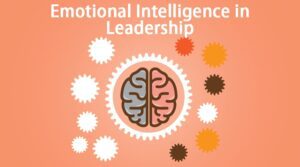In the dynamic and complex leadership landscape, possessing technical skills and a strategic mindset is essential. However, a leader’s success is not solely determined by these attributes. Emotional Intelligence (EI) has emerged as a critical factor in effective leadership, influencing everything from team dynamics to organizational culture. This article explores the indispensable role of Emotional Intelligence in leadership and its impact on fostering a healthy and thriving work environment.
Understanding Emotional Intelligence:
Emotional Intelligence is defined as the ability to recognize, understand, manage, and influence one’s own emotions, as well as the emotions of others. In the context of leadership, this skill set becomes instrumental in navigating the interpersonal aspects of managing a team or an organization.

Self-awareness:
Emotionally intelligent leaders have a deep awareness of their feelings. This self-awareness enables them to manage their reactions to situations, maintain composure under pressure, and make well-informed decisions. Leaders in tune with their emotions can better connect with others and build trust within the team.
Self-regulation:
Leadership often involves navigating challenging circumstances and regulating emotions are crucial in maintaining a positive and constructive work environment. Leaders with solid emotional Intelligence can control impulsive reactions, handle stress effectively, and make rational decisions, even in adversity.
Empathy:
Empathy, a key component of Emotional Intelligence, is the ability to understand and share the feelings of others. Leaders who demonstrate empathy foster a sense of belonging within their teams. This connection enhances communication, builds trust, and promotes a collaborative atmosphere where individuals feel valued and understood.

Social skills:
Influential leaders excel in interpersonal relationships. Solid social skills enable leaders to communicate persuasively, resolve conflicts, and build strong networks. By creating a positive and supportive work environment, leaders with high Emotional Intelligence empower their teams to collaborate, innovate, and achieve shared goals.
Impact on Leadership Effectiveness:
Leadership is not solely about achieving organizational objectives; it’s about inspiring and guiding a team toward success. Emotional Intelligence enhances leadership effectiveness in several ways:
Improved communication:
Leaders with high Intelligence communicate effectively, adapting their communication style to the needs of their team members. This fosters clear understanding, minimizes misunderstandings, and encourages open dialogue within the organization.
Enhanced decision-making:
The ability to recognize and manage emotions aids leaders in making informed and rational decisions. By considering the emotional impact of decisions on individuals and the organization, leaders with high Emotional Intelligence make choices that contribute to long-term success.
Building strong relationships:
Emotionally intelligent leaders prioritize relationships with their team members. By demonstrating empathy, actively listening, and showing genuine concern for the well-being of others, leaders build trust and loyalty, which are crucial for a cohesive and high-performing team.
Resilience and adaptability:
In the face of challenges, emotionally intelligent leaders display resilience and adaptability. Their ability to manage stress and stay composed during difficult times inspires confidence and stability within the team.
Conclusion:
Emotional Intelligence stands out as a fundamental skill set in the ever-evolving leadership landscape. Leaders prioritizing self-awareness, self-regulation, empathy, and strong social skills create an environment conducive to collaboration, innovation, and overall success. As organizations recognize the significance of Emotional Intelligence in leadership, investing in developing these skills becomes crucial for building resilient, effective, and inspiring leaders.

